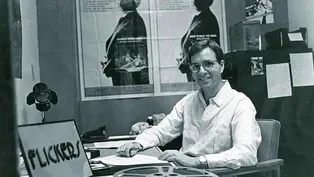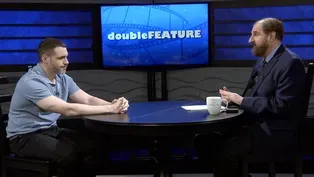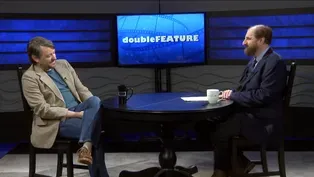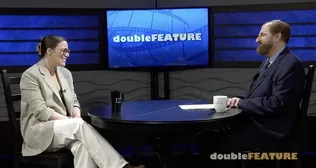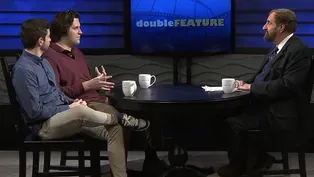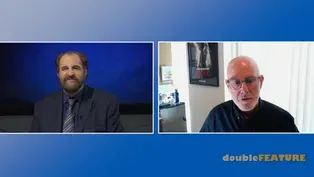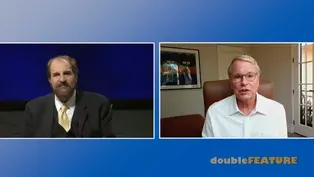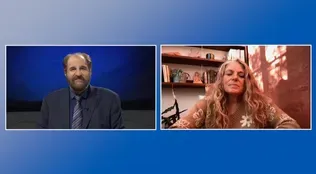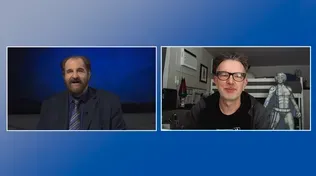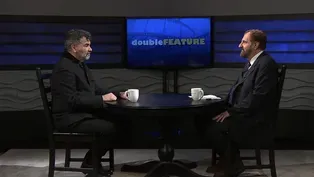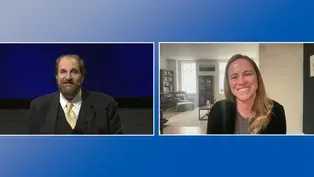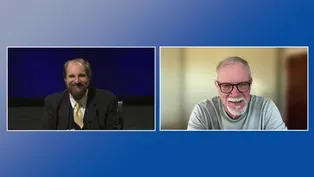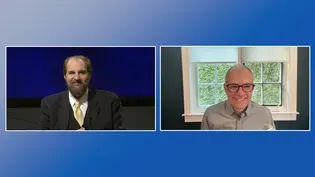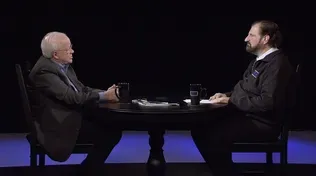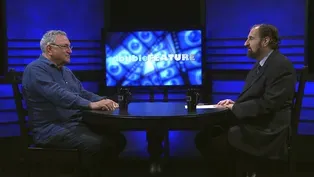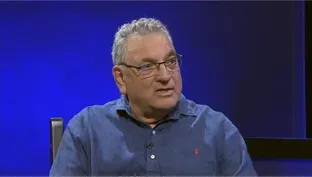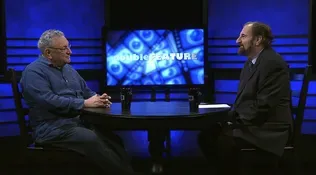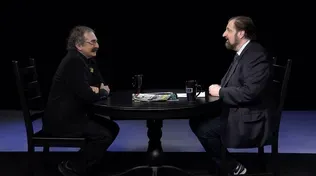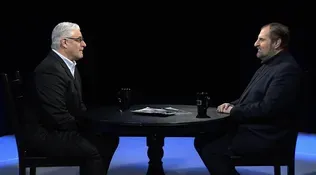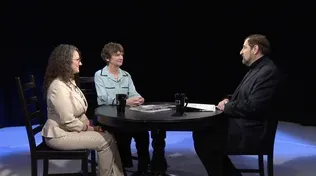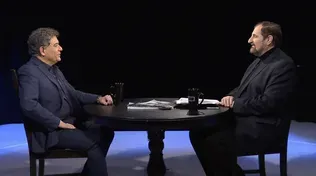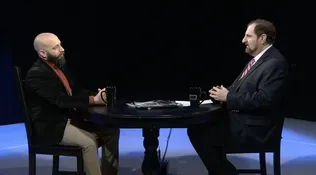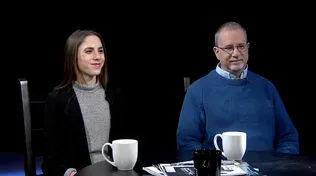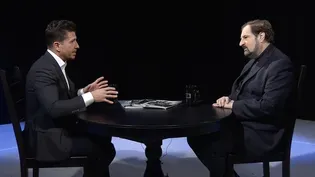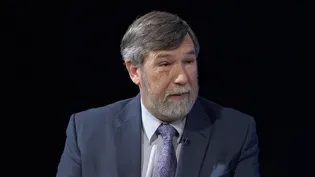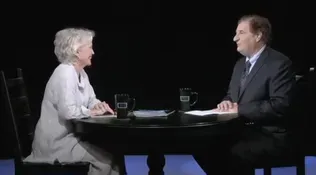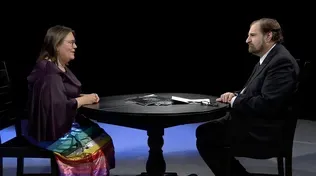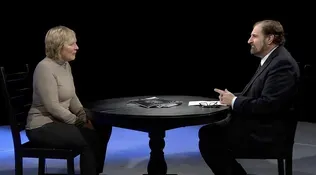
Interview with Emma Barber
Clip | 44m 59sVideo has Closed Captions
Steven Feinberg interviews First AD, Emma Barber.
Director of the Rhode Island Film and TV Office, Steven Feinberg, interviews Assistant Director, Emma Barber. Barber is known for Hocus Pocus 2, Out of the Blue, and Space Oddity.
Problems with Closed Captions? Closed Captioning Feedback
Problems with Closed Captions? Closed Captioning Feedback
doubleFEATURE is a local public television program presented by Rhode Island PBS

Interview with Emma Barber
Clip | 44m 59sVideo has Closed Captions
Director of the Rhode Island Film and TV Office, Steven Feinberg, interviews Assistant Director, Emma Barber. Barber is known for Hocus Pocus 2, Out of the Blue, and Space Oddity.
Problems with Closed Captions? Closed Captioning Feedback
How to Watch doubleFEATURE
doubleFEATURE is available to stream on pbs.org and the free PBS App, available on iPhone, Apple TV, Android TV, Android smartphones, Amazon Fire TV, Amazon Fire Tablet, Roku, Samsung Smart TV, and Vizio.
(projector clicks) (projector whirs) (projector clacks) (intense music) (air whooshes) (aching music) - Hi, I'm Steven Feinberg, executive director of the Rhode Island Film & Television Office.
Our guest tonight is a wonderful Rhode Island first assistant director, who has worked on such incredible productions as Walt Disney's "Hocus Pocus 2," "Good Burger 2," and the "Ted" television series, and, most recently, the 20th Century Studios film "Ella McCay," starring Jamie Lee Curtis, Woody Harrelson, and Emma Mackey.
I am so pleased to welcome Emma Barber to "doubleFEATURE."
Hello.
- Hi, Steve.
Happy to be here.
- Oh, I'm so glad.
Now, you are someone who has worked on some fabulous productions.
Ya just finished working on "Ella McCay" that James L. Brooks directed, and he's known for co-creating "The Mary Tyler Moore Show."
He created "Taxi," executive producer of "The Simpsons," and has done movies like "Terms of Endearment," "As Good as It Gets," "Broadcast News."
Now, tell me what a first assistant director does on a production of that stature.
- (huffs) Well, I like to say that we do everything so that the director doesn't have to, (chuckles) so that the director... We stand next to the director, essentially, on the set and worry about all of the comings and goings of the crew so that the director can focus on the story and the characters and the actors so that he's not distracted by, you know, "Are we set up?
Do we have the right props?
Is the set dressing correct?
Are we in the right location (chuckles)?"
You know, so we literally manage the set.
We're the managers.
- So, you're the managers.
And you're the voice for the director and making sure that each department is doing their job.
- Yeah, the, you know, master communicators really, just communicating with all the departments so we're all on the same page, know what's going on.
- Wow, that's a lotta work.
- It is, but I love it.
(both laugh) It takes a certain kinda person to do that.
- Let me ask you something.
When you're working... Let's say you're working at the State House and there's a dialogue scene that's happening in the corridor and you've got extras and you've got props.
Are you... D'you have, like, a checklist?
How does that work?
- Well, at this point in my career, I mean, I have a mental checklist that is just sort of automatic.
Like, I know all of the elements I need, and it's...
When I realized what the first assistant director's job was, early in my career, I realized that I was cut out for that sort of job because of my ability to memorize the details.
For other people working for me, I have people who are responsible to help make sure that everything is happening, and having a staff who you trust, as well, is essential.
But yeah, my own mental checklist: checking with my second second AD who's on set with me, my key PA, the production assistants.
They all have some responsibility along those lines of making sure it's all there and ready to go, but yeah, the master checklist is definitely just upstairs.
- In that scenario, I just told you about, which actually is in the movie of "Ella McCay," where you have... Let's say, you know, Ella's walking, and I think it's her boyfriend or her husband walking.
And then you have these extras walking by.
Are you dealing with those extras walking by also?
- Yeah, yeah, I would say that dealing with the background actors is the one real creative thing we, as ADs, get to deal with, unless your director really cares about your background.
I worked with another director, Morten Tyldum.
Morten Tyldum?
Yeah.
"Tyldedum?"
And he cares very much about the background actors, so he very much cares about everything happening within his frame, so he gets involved in the extras' direction.
But on some films, the directors don't care, and they just say, "Go have at it."
And so it's fun to get to set those people and give them their own little stories and their own direction to walk and to go.
- [Steven] And their timing, right?
- And the timing, yes, essential, based on, you know, actors' dialogue because, if they're all walking around and nobody's talking, then they're not gonna make the cut so you've gotta be very (chuckles) careful about how you're setting the background.
But yeah, it's the one part of the AD's job that gets to be a little creative.
- Are you thinking of composition too, where you're having people walk on diagonals?
- Oh yeah, it's... Well, (chuckles) you know, we like to say banana-ing.
You know, we have them walk in a banana so that they make it on camera but get outta there.
- Yeah.
- But definitely.
You know, it's funny.
I find myself, when I'm just in life, like at a restaurant or walking down the street, watching people and, like, analyzing their action and what looks natural and what doesn't look natural, because there's nothing worse, especially because I work in film and television, than watching a movie, focusing on the background, and seeing it not look good: like, stiff or outta place.
Or like, you get a bunch of background in for a minute.
And then there's nobody, and it's, like, Grand Central Station or it's, you know, the Sahara Desert.
So it's an art form of, like, how much, how many, when, not being too distracting, because you don't wanna take away from what's happening in front, which is the story.
But yeah, it's a lot.
- Was that something that you found that was training?
Or just natural?
- Oh, I think it's a little bit of both.
Some people might have a natural knack for it, but it definitely takes a lot of training and really understanding what looks good.
You know, and again, it's like the idea of, like, someone banana-ing in a scene because you need to make sure they make it into the frame but also get outta the frame.
It's not natural.
Nobody would walk that way.
So, there's a little bit of, like- - [Steven] Finesse.
- "Finesse," yeah.
- Finessing.
Now, Emma, what's your background?
Where did you grow up?
- So, it was a military brat, but my dad retired, and we moved to Massachusetts when I was in high school, well, junior high school.
I went to BU, Boston University, and I accidentally found my way into film and television.
I originally wanted to get into politics.
I really wanted to go to law school and...
I don't know what I really saw myself doing, but I wasn't ever a kid with a camera, which is what I tell people.
I was not a kid with a camera, growing up, but when I was a...
Between my senior and freshman year of college, I had my room redone on; I think it was ABC Family or PBS; this show called "Knock First," which was done by Scout Productions, a local production company.
And I became so fascinated by what was happening behind the camera.
That I said to the president of production, this guy, Seanbaker Carter...
I said, "This is so cool, I would love to do this.
D'you hire."
- And you're in college?
- I was 18 years old.
I hadn't started college yet.
Like, I hadn't even... You know, like I said, I was pursuing a law degree, I thought.
So he calls me up in the fall of my freshman year of college, and he's like, "You still wanna do this?"
And I was like, "Yes."
(laughs) He goes, "Well, I've got a TV show called 'Sox Appeal,'" which was a Red Sox dating show, so I was a production assistant for this dating show.
And then every day since, I showed up to Scout production.
I was an intern.
I was a PA on their shows when they were shooting, all through college.
Wasn't receiving credit at the time because was not in the film program.
Wasn't being paid unless it was as a production assistant.
- But you were gaining experience.
- Was gaining experience.
But then, I eventually transferred into the College of Communications at BU and changed my major to film and television, but it was sort of all accidental.
- Wow, and did you have an idea what you wanted to do on a production?
Or right now, you're just kind of feeling it out?
- At first, it was feeling it out.
It was, like, really exciting to be with the cameras, and we filmed in Fenway Park, like, for the summer and, you know, in the fall.
It was incredible.
But then I got my first real job as a director's assistant, which is different than assistant director (chuckles), on a film called "My Best Friend's Girl," which was...
The director was Howie Deutch, who directed "Pretty in Pink" and "Some Kind of Wonderful," and that was in 2007.
- And those were written...
Weren't those written by John Hughes?
- John Hughes.
I have his phone number in my cell phone.
- Wow.
- Yes, little brag.
I got to call him a couple times before he passed, unfortunately.
- Yeah, legend.
Yeah, so, I was working for Howie, and that was the first time I understood what a first assistant director was, 'cause it was my first time on a real feature.
- [Steven] Studio production.
- Correct, yeah, so, before, I was doing mostly, like, docuseries reality television, where you don't really see that AD role, and I realized Casey Caldwell was the first AD, who's phenomenal, and I was like, "He's, like, the politician of film set.
He's the guy.
He's the in-between who, you know, talks to the above-the-line and the below-the-line."
- [Steven] Like, a stage manager.
- Yeah, and I was like...
It was a role, a position, that really resonated with me and what I thought my abilities were, and because I said, "Oh, I'm not a kid with a camera."
I knew that I never had my own vision, my own creative vision, but I thought that I had, like, the tools to help the director with their vision.
So, that's sort of... After that job, 2007, as a junior in college, I was like, "That's the job I want," and since then was- - "And I'm good at."
- Yeah, (chuckles) yeah.
- And was Casey a mentor to you?
Or who was your... Did you have any mentors?
- (sighs) I mean, I feel like I took something away from everybody I worked with.
Good or bad, you know, I'm always looking to see how everybody...
Even now, even today, if I have an opportunity to be on a film set, like watching how other ADs do their jobs so that I can be better at mine, whether that's to do something they do or not to do something they do...
So, I don't know if I would...
I've definitely had a couple mentors: Casey, just as an influence, as the person who I realized "this is what I wanna be."
But I don't know that we necessarily had a personal relationship where he was, like, mentoring me.
- There's nobody you would ever ask advice of?
- Oh, yes, so, several ADs, this AD Francisco Ortiz.
I worked with him on "Dexter," but he's very good.
He's very smart.
He's very involved with the DGA.
He's on the board, the council, and he's always been a bouncing board for me.
Is that the right word?
"Bouncing board"?
Sounding board!
- [Steven] Sounding board - Sounding board.
- You're thinking a bounce board for- - A bounce board.
For light.
- For lighting.
(both laugh) - A sounding board.
He's great.
He's always been somebody I could reach out to, another first... And these are people I've worked with recently, and I think it's because, now that I'm actively pursuing the role of a first AD, I'm finding myself reaching out to these people more.
- And you're more experienced.
You're more mature.
- And know the questions to ask, I suppose.
- Right, right, right.
- Sebastian Mazzola was another first AD I worked with.
We did the "Juliet" pilot together in Boston, and he's just such a kind man, and it's, you know... You find, in this business, that our position, especially as a first assistant director...
Sometimes, that role can be assumed by somebody who's a real, you know, (mumbles).
- Right, tough- - Tough cookie.
(Steven laughs) And I often found that there were people I worked with who I said, "This is not how I want to be in AD."
- Just as important.
- Yeah, and Sebastian was somebody who had an ability to do his job very well and be very kind to everyone, and I felt like that was such an asset because, as an AD, sometimes, you're seen, a little bit, as the bad guy on set because you're the one who's telling everybody, "We gotta go," you know, "You don't have time to do this."
It's a interesting position to be in.
- I found out that there are some folks in my 20 years of doing this and then before that.
We had a guy, Charles Rathburn, when I was doing the film "Fortress" in Australia: "Quiet, please."
- [Emma] I know that name.
- He had a great voice, but I've seen a few people that I actually like but who push the crew too far with their personalities in a not-so-pleasant way.
And they've actually had more challenging times to get additional work because of that.
- Yeah, it's absolutely true, and it's... You know, as a first AD, you really do set the tone.
You're really the person 'cause you're the one who's on channel one talking to the whole crew.
They're hearing your voice all the time.
You're really the one commanding the set and making sure that everybody's going in the right direction, so if you're not nice, people are not gonna like you.
- You wanna be a calm commanding voice.
- Exactly, and people have to trust you.
I've always said to people coming up in the business as production assistants and whatever, "One of your most valuable assets is to be likable."
And it's not like, you know... (chuckles) It's hard to tell (indistinct) "You gotta be likable," but it's true.
You spend hours with people.
- It's good that you're conscious of that to share that.
- Yeah, you spend 14... You spend more time with crew members, generally, than you do your own family, and it might be for, like, four months.
It could be up to eight months.
But then you're spending, you know, 12 to 16 hours a day with people on set, so yeah, being somebody that they can stand to be around for that long is important.
- Being kind and useful.
- Yeah, and Sebastian, to me, really was exemplary in that way, so I reached out to him quite a bit also.
- That's fabulous.
So, tell us the difference between, like, a first assistant director and a second assistant director if you can.
- I can.
(laughs) I can.
(Steven laughs) The assistant director's department is made up of three assistant director roles.
There's the second second assistant director, the key second assistant director, and the first assistant director, and I have valued, on my way to the role of first AD, to assume all of those jobs so that I understood what they did, so that, as a first, I'm not assuming that I'm telling anybody to do something that I haven't done myself.
And some people don't have to go all the way through every role.
You can always tell when you've worked with a first who has not been a second AD, but a second AD really is the person who's thinking about the next day.
They make the call sheet, which is, you know, the piece of paper that has all of the information, and that's derived from a document that the first AD makes, which is the one-line schedule, the shooting schedule.
But it's the second AD's job to be communicating with departments about what's coming or what to be planning for, so they might be a week or two out in advance to make sure that they're communicating with the prop department, you know, "do you have these props for these upcoming scenes?"
and communicating with the actors, the incoming actors, who might be coming from out of state, costumes departments doing fittings.
If they need to go get haircuts or hair dye, you know, things of that nature, they're planning for tomorrow, whereas the first AD is really... And maybe to talk more about later, prep, as part of production as a first AD, is so essential to me.
Prep is, like, planning so that you've thought of every scenario and everything that could possibly go right or wrong and then be ready to roll with it on the day so that, on the day, which is where the first AD really shines, (chuckles) you know, you're really ready to take anything that comes at you so that you can get from the call time to wrap at the end of the night.
And a first AD really has to have a good, strong relationship with their second and trust that their second is getting the next day prepared, because, as the first, while you are thinking about what's to come and the shoot as a whole, when you're in the moment on set, you need to be focused on what's happening with the director and with the actors and with your crew so that you're making the day.
- Are you... Who's your immediate boss?
- The director.
- "The director," so are you getting, though... You know, you mentioned about "hey, we're running a little behind."
Will you hear that from, like, the line producer or somebody?
Or not?
- If I'm not doing my job.
(laughs) If I'm doing my job, we're not running behind, but it's usually my job to say that.
- Again, different movies, different... Let's say you have to do two pages a day.
- [Emma] That would be great.
- Huh?
(Emma laughs) - [Emma] That's a great page count for the day.
- Right, so, independent films, it could be eight pages a day.
- And they are.
- Right, but let's say it's two pages.
Let's say it's a studio film, two pages a day.
It's pretty leisurely thing.
It's a non-action film, - Depending.
- If it's not an action film, let's say.
So, let's say you're doing two pages a day, and the director's a director who likes to do multiple takes, and you have, you know... We're doing this shot and this shot and this shot and this shot.
How do you say, "Hey, we're a half-hour behind"?
How does that... Tell me what you do.
- Well, I have found, in my own career so far as a first, that honesty is the best policy.
I'm pretty straightforward, and I don't like to skirt around the details.
I don't like to sugarcoat anything.
I don't think I'm doing anyone any favors by telling the director or the DP that we're doing great when we're not, so I'll be the first to say, as you did just now, "Hey, we're running 30 minutes behind."
Typically, what I would do in that situation before going to the director is I would talk to the director of photography, the DP, which is why the relationships the first AD has with those counterparts is really essential.
And if you have good trust with your director and your DP, they trust you, you trust them...
I've been able to have conversations with the DPs and say, "We're behind.
Are there shots that we can eliminate?
Is there a way that we can accomplish what we have left, you know, in less?
What would you recommend?"
And we sort of strategized: like, "What can we do?
What can we get rid of?
What's not essential?"
That way, you sort of come to the director with a little bit of a plan if you need one.
If you don't think you're gonna be able to walk up to the director and say, "We need to move on," they're gonna still wanna spend 30 more minutes on what they're doing, being able to strategize with what you can do to save the day, essentially.
But I wouldn't sugarcoat any of that.
I do have very honest and deliberate conversations with those people because, if you don't, you're just- - What's the point?
- playing in the sand, (chuckles) so.
- What about...
I've heard that there have been times where a director will say, "My God, the light is not what I anticipated."
Apparently, it happened to Steven Spielberg on "Saving Private Ryan."
They were going to film out in a field, and they come across a Nazi, and there's dead cows everywhere.
And the light was not, somehow, what they thought it, and they had to totally rearrange.
How do you deal with something like that?
- (huffs) Well, like I said, hopefully, you've done enough prep to have some strategies or some things in your back pocket, like "is there any"...
I've definitely been on sets where something has not worked out and we've had to pull something else out of our pocket to shoot, but I mean, I think if you're dealing with Steven Spielberg and "Saving Private Ryan," you have the money to just (chuckles) futz around.
- But even they... Something was wrong in their planning with the light somehow.
- Well, I always laugh when I receive a script that has, like, "dawn" or "dusk" written, because, if you're shooting at dawn or dusk, you have nine minutes to shoot so you better accept that it's gonna be daytime or nighttime.
Which is it?
Pick one.
I'll usually have that conversation and prep a lot with the directors, you know?
"Well, what is it?
What do you actually wanna see here?"
But gosh, in that case- - Like, you said, "I have to plan for, like, the best in the worst case."
- Right, so, like, for example, if you had rain...
I mean, hopefully, it's, like, they weren't all set up ready to roll and he said, "I don't like the light here."
Hopefully, you have some things in your back pocket that you can shoot.
Like, if it's just really about the master that he is not gonna like of that shot, can we do the coverage?
Can we punch in and get some of the dialogue here?
Like, we won't have this beauty shot we wanted.
Let's reschedule it, you know, 'cause, often, you deal with rain, so like, when you're scheduling a schedule, you'll have some covered sets towards the end so that, if you're dealing with weather and you can't do your exteriors, you can pull up your interior work and have something to do, because the worst thing you can do is be standing around with your hands in your pockets, so having some backup plans.
- You know what's amazing, too?
This must really help you guys: technology- - Oh yeah.
- because, back in the day, you wouldn't know what the weather...
There was no doppler.
- Oh yeah, we get like the I AccuVWeather, like, right to our phone.
We can call, and as a second, you deal with the weather all the time.
There's people you can just call, like meteorologists, and be like, "Hey, excuse me, it looks like there's a storm coming.
Can you tell me when we're gonna get the lightning?"
- And I've had a meteorologist call me and say, "Steve, please, let the productions know I'm available if they need anything."
- That's cool.
- Yeah.
- Yeah, that's great, smart of them.
- Yeah, so, just having that, like... You wouldn't have had that 30 years ago.
- No, I always laugh when I hear stories about... You know, as a second AD, you're making the calls or sending emails at the end of the night, and well, we're accessible 24-7 with our cell phones now, but you know, I like hearing the stories of the kid who had to stand at the phone booth with the quarters.
(laughs) - Yep, lemme ask you something 'cause when I said 30 years ago... You know, I'm noticing now that crews are much more diverse.
The crews get younger and younger.
There are more women.
There are more people of color.
It makes me feel so happy that there's access.
There's more and more access.
Have you had any challenges in your time being a woman?
Or do you think that the doors are just open and nobody's seeing that anymore?
Or is there less as time has gone on?
- I think it's gotten significantly better.
Coming up as a PA and a DGA trainee and as a second second, there definitely was a boys' club, definitely a boys' club, in New York and in Boston, undeniably, and it's one of those situations where I found myself in interviews, like, raving about these people I'd worked with, locals.
And it finally hit me.
I was like, "They're not doing the same thing for me."
There's, like, a Joe Schmo, Sean, you know, Mark, whomever, whose names are coming up before my own, I'm sure, in these meetings, and here I am throwing out all of their names.
- But they're not reciprocating - Well, exactly, and I think it's... You know, (huffs) it's tough.
I was actually just on an AD panel for women in film, and it's a topic we had to talk about, not that it's uncomfortable, but it was there.
There was a boys' club.
It was more difficult for me to get on sets, to get jobs, which is why I pursued the DGA trainee program, because that was guaranteed work for two years.
And then coming outta that program, I had made really strong connections.
I knew that I was good at my job.
I knew that was a threat to the boys and the boys' club, that I was really good at my job.
- But I had- - I like how...
I gotta tell you, you carry yourself so well.
- Oh, well!
- No, ya do!
- Comes with the job.
- No, you do!
Again, it's kinda what I had mentioned with another guest about trust and confidence and trust, and what you said is "why should I sugarcoat things?"
You know, it's great.
- It's true, and you know, it was.
It was a tough road.
I left Massachusetts.
For a long time, I worked all over the country because I would go where I would get hired and I wasn't getting hired by the locals.
You know, I wasn't getting the recommendations here, and it wasn't until I had made those connections with people from LA and New York, who would come to Boston.
And then they'd know my name, and I would get hired, and now I'm in the position where I get to do the hiring.
- Isn't that awesome?
(Emma laughs) Tell me about the DGA training.
And how did that affect your career?
And what did you learn?
- Oh, well, it was a great opportunity for me 'cause, like I said, I knew that I wanted to be an AD, and applying to the DGA training program is a little bit like applying to college.
You have to take an exam.
You have to submit a resume with essays.
You have to have recommendations from people.
And then you go through several interviews.
They have, like, an interview company they hire out to, you know, whittle down their numbers.
And then you meet with the director's board - [Steven] Is this in Los Angeles?
- There's one in LA, and there's one in New York.
I did it in New York, and I like to say that, if you can make it in New York, you can make it everywhere.
- You can make anywhere.
- It's true, without a...
It's the most true statement there is, (tuts) but yeah, I remember when I got accepted.
They accept, basically, seven people out of, like, couple thousand applicants.
Sandy Forman, who I call my DGA den mother, said I had the biggest reaction she had ever gotten from calling someone to tell them they had been accepted.
I remember I was in the post office.
I screamed.
I yelled.
- [Steven] Oh, that's wonderful.
- Just very excited, but I told them in my interview with the DGA board.
I was like, "Listen, I'm gonna be a first AD with or without your program, so you can either let me into your program and teach me how to do the job the way you'd like me to do the job.
Or I'll have to figure it out on my own, and I'll probably touch paperwork I'm not allowed to touch.
And (chuckles) I'll get there, and you'll see me eventually."
So they let me in.
(chuckles) And so what the program does is it assigns the trainees to jobs, television and film, in New York City, around the country.
It's guaranteed employment.
You get housing stipends.
If traveling with the companies, you get health insurance.
It's great.
And then yeah, the guaranteed work- - Are you getting DGA rates?
- You get DGA rates.
You basically get an additional second AD rate, but yeah, you're trained through the program.
You get to go to seminars that the DGA hosts, training seminars, and you know, the directors come and all kinds of things.
- Full access.
- Full access.
It's great, and there's... Obviously, people trust the program.
Other ADs trust the program.
You know, there's a certain amount of sort of... Not respect, I don't know if that's the right word but, you know, an assumption that you know how to do your job.
And I will say that, coming outta the program, you do get chained to the desk a little bit, I like to say, because you are doing a lotta the paperwork, but that is the DGA-assigned work that you otherwise wouldn't have an opportunity to see as a production assistant, because you're technically...
It's covered work.
You're not supposed to.
So having that leg up is essential.
And then when you graduate the program, you're automatically can join the DGA as a second AD.
- How long is that program?
- It's usually about two years.
You have to get a certain number of days, I believe it's 350 days as an additional, or, excuse me, as a DGA trainee, which is the equivalent of what a non-union AD would need to submit to join the DGA union as a DGA member; otherwise, if you're not doing non-Union AD days, you join the DGA having done like 650 production assistant days.
And those are all things you acquire.
You put a book together, submit it.
- Now, what shows did you work on during that time period?
- I did "Man on a Ledge," "How to Make It in America."
I did, as everybody does, like, "SUV," or "SVU."
- [Steven] Ah, yeah, my mom's favorite show.
- Everyone does "SVU," yeah.
- "Law & Order: SVU."
- (chuckles) Yep.
I did the movie "42" with Chadwick Boseman, which was phenomenal.
I did "That's My Boy," an Adam Sandler movie that was in Massachusetts, which was fun.
I got to come home for that one.
I did... (sighs) Oh, there was so much television I did.
- So, when you came out of that, how did you feel?
It was two years.
- Well, so, I had a different, I think, approach to leaving the program than a lotta people might, which was I recognized that I had been tied to the desk a little bit, which meant I was doing a lotta paperwork in base camp, and I didn't have the opportunity to work as a production assistant as, like, a key PA or to run background as a background PA. And those were all jobs I knew that I wanted to have done before I assumed the role of the second second AD, because, again, I'm not gonna go stand on set and tell the key PA or background PA to do something that I've never done myself, so I decided to continue to PA.
So even though I was technically in the DGA, I worked as a production assistant for several more years.
I'd pick up additional AD days on shows.
But then when I felt like I had that all under my belt, that I was good at it, I started accepting- - It's almost like you were wanting to know how to run a restaurant from how to buy ingredients, do all this stuff, to, finally, "now I'm ready to run the restaurant.
I've cleaned the bathrooms.
I've done the whole thing."
- Yeah, exactly.
Well, that's exactly it.
You have... You know, nothing makes me more annoyed than an AD or a key PA who won't carry around hot bricks on their belt, because they think that they've graduated from having to do that responsibility.
And it's like, "I'll carry a hot brick on my belt right now as a first AD, because if someone's walkie"- - We're talking walkie-talkie- - Walkie-talkies, yeah.
- just for the... - [Emma] Yeah, for the people at home.
- Right.
(laughs) "What the heck does she mean by a hot brick?"
right?
- Yeah, there's no job too small or non-essential, because it's all an important part of the process.
And the minute you start, you know, dismissing jobs, it also dismisses the work that your PA's doing.
You know, if you're saying, "I'm too important to do that," how does that make the PA feel?
One of my big things about ADing is trying to change the culture a little bit.
- Right, being respectful of what people do, treating others the way you want to be treated, and having that collegial feel.
Let's talk about...
I remember you worked on the Kyra Sedgwick movie with Kevin Bacon: "Space Oddity."
There was a movie we did in Wickford, Rhode Island.
Talk about that.
- Well, that was my first full feature as a first assistant director, which was very exciting.
And it was with Kyra, and it was her first time directing a feature.
And it was great for us to sort of, I think... You know, we had a... We really supported each other, I felt like, in knowing that we were both sort of going into something that we were experienced enough to be doing but hadn't had the opportunity to do it yet, and Kyra was really adamant about giving opportunities to people but also giving opportunities to women.
You know, it's important because it's not... A first AD...
There aren't many; I have only worked with two in my career; female first ADs, which is why I wanted to become one also, because wanna change that dynamic, but she was wonderful.
The whole cast was wonderful, and I was lucky working with Kyra because my first... Well, when I worked with Howie Deutsche, one of the first things I understood about directors was that you have actors' directors, and actors' directors are the type of people who, like...
They tell the DP, like, "You can make the shot list.
I trust you.
I'm gonna just focus on my actors and their storytelling," and that's the kind of director that Howie was, and that's the kind of director that Kyra was because that's her background.
She comes from acting.
- [Steven] Acting, right.
- So, it was important for me to have already understood that, knowing that she's gonna put a lot of responsibility on me to handle the production, which was great because that's my bread and butter.
So it was nice to have that trust, because, I think, neither of us really knew any different at the time either.
You know, it's my first time being a full-time first, her first time directing, and we're getting to do and be trusted with what we're comfortable doing.
Like, she I don't feel felt like my world was out of control, and I felt like she was in control of her world, so she was gonna get what she wanted.
I was gonna make sure I got what I wanted (chuckles), and it was great.
- Did you find yourself spending more time with the director of photography, the DP?
Or did she?
- A little bit of both.
That's really where, I think, that relationship I understood to be important with the DP, like, "how can we make up this day?"
if we're losing time, if we're behind schedule: "What can he do to help us?"
And he was great.
He was- - So, on a project like that, how many pages would you have to do per day?
Because that was a relatively...
It was an independent film.
It was a small scale as far as budget.
What kind... How many?
- We average around five-six pages a day.
It was a lot of dialogue.
- How many days of filming?
Do you recall?
- Oh gosh, it was, I think, 19 or 20 something.
It was short.
It was quick.
It was like four weeks.
- You're doing five-day weeks or six?
- Five-day weeks.
- Five-day weeks.
- Is that your preference?
Five-day weeks - Typically, yeah.
- Some people do six-day weeks.
- Yeah, I don't really necessarily see the benefit in that- - I don't either.
- because you're just gonna wear out your crew, make 'em tired, not wanna come to work.
- So, what were some of the highlights of "Space Oddity"?
Do you recall?
- Well, the cast obviously was phenomenal.
I mean, working with Kevin Bacon blew my mother's mind, and working with Kyra, for that matter.
I mean, she's got a resume all of her own that's impressive, and the whole cast was really phenomenal on that.
The flower farm we worked on was beautiful.
It was a beautiful place to spend my summer, you know, and to have that experience but my crew especially.
My PA staff were some close friends.
My second second AD on that was a dear friend of mine, who I loved.
It was his first time being a second second AD.
I was able to give him that opportunity to step up in a role he was ready for.
He unfortunately passed away.
- I remember that.
- Yeah, Tyler.
- I'm sorry.
- Yeah, but it was so special to have had that job, which, to me, was such a perfect job, like, from the beginning to end, like in prep.
I had my birthday in prep, and Kevin Bacon sang me "Happy Birthday."
Like, what more could you want?
But then to have the shoot go so well... You know, I think we made all of our days.
We never had any, like, panic moments of we're... Well, we had one- - I remember there was that rain.
(Emma speaks indistinctly) There was a day with thunderstorm.
- Yeah, but even then, like, we had cover, no, and we had options, and like, we made every day, and it was... Everybody was very passionate about the project.
Everybody cared about the end result, which is so important and you don't always see on the bigger productions, but to have those memories with Tyler was just...
It's so special, so.
- Cool.
What about...
I think... Was it around that time?
Mighta been before you did a movie "Out of the Blue"?
- [Emma] "Outta the Blue," yeah.
That was a good one.
- [Steven] That was with Diane Kruger, - [Emma] Diane Kruger and Jack Nicholson's son.
He's gonna hate that I don't remember his name.
- [Steven] I forgot (Emma laughs) - It was Jack Nicholson's son, who was a PA with me once.
When I did "That's My Boy," he came and was a political PA.
He's a nice kid, but it was nice to see him in front of the camera.
It's probably where he belongs.
And then that was with Neil LaBute, the playwright, who's phenomenal.
- And that was a thriller.
- It was.
Yeah, it was a thriller.
- Yeah, a thriller.
- Not really my genre, but it was great.
I mean, we had... That was a day, or excuse me, that was a job that we had multiple company moves a day.
- Were we dealing with COVID at that time?
- We were just beyond COVID because, "Outta the Blue" was after "Space Oddity," and "Space Oddity," I remember, like, the last day of shooting.
We got the okay to, like, take our masks off.
- Thank gosh.
- The mandate of "whoo!"
(Emma laughs) But "Out of the Blue," we were past sort of the COVID of it all, still, you know... You're always dealing with those kind of safety precautions, which were a good thing.
- [Steven] That was an additional thing you had to worry about.
- Oh yeah, yeah, but that shoot was crazy.
That we were... And it was very dialogue-heavy, very dialogue-heavy.
We were doing like eight pages a day, and company moves every day.
I think we had... We shot 18 days, and I think we had like 30-some odd locations, so it was very difficult, but we made our days, always made our days.
- Fantastic.
What was it like working on "Hocus Pocus 2"?
I know you worked on "Hocus"- - Argh, God, that was such a thrill because, I mean, I grew up... Like, that was my movie growing up was "Hocus Pocus," urgh.
And Bette Midler!
Are you kidding?
So, she has...
I don't know.
People might know this.
She's known as The Divine Miss M. That's what they called me growing up: The Divine Miss Em.
- Oh.
(laughs) - So she was just like...
I didn't get to work directly with her.
I got to work with her stunt double, who was also fabulous, but I had a great time working on "Hocus Pocus 2," because I got to do some of the wire work, some of the stunt stuff.
- [Steven] Were you doing some of that in Newport?
Or were you- - I didn't do Newport.
I did a lot of the stuff over in College Hill with the witches chasing the kid on the bike and flying down the streets, and it was a lotta fun.
And we did some stuff on stage.
- Did you do the stuff on Federal Hill when they left the pharmacy?
- No, I was there for that day.
We were prepping during that, so I got to be on set to watch all of that.
It was so cool.
I mean, just urgh, like, to work on a movie like that is... You know, when you're a kid, growing up, those're the movies you watch that, like, make you wanna work in movies.
- Right, and the nice thing is, too, that film had the most viewers worldwide for an original film streaming.
- Oh really?
Didn't know that.
- Yeah, so it broke records.
I remember talking to the executives at Disney, I'm like, "Why didn't you release this film at the theater?"
And they said, "Steve, you know what?
In hindsight, we realize we should've done it.
But then we realized it"...
I think it was September.
They had had a screening, and everybody was dancing, and it was very interactive.
And because of the contracts that they had with women and all this other stuff, they never would've got it done on time, so it became, like, the number one, like I said, screening for streaming services, but now they're talking about doing a theatrical for the next one they're working on, a additional one, but.
- Oh, good.
- Well, I hope so.
I mean, I don't know why they ever thought they wouldn't have had an audience to do that, and I love going to the movies.
Like, it's great that we have the access we do, but it's so... - There's nothing like the theatrical experience.
- Nothing like that.
- And that also, I think, raises the prestige of a film, when it goes into streaming.
So, how many days did you work on... Did you work on "Hocus Pocus" the whole production?
- [Emma] Not the whole production.
I probably got three to four weeks of work out of that, like, throughout.
Like, I'd come in for a week.
Then they'd not do some stuff.
- Like, when you're doing stuff at College Hill, what was that?
What kinda planning do you have to do for that?
- (huffs) So, I was lucky for the second unit of that we had Mark Varga or Vargas, who was the second unit director, who's also a talented DP, director of photography, so he was doing both.
He was shooting and directing, which was great for me because it really expedited the process a lot because he knew exactly what he wanted, which makes it so much easier.
- Now, second unit, just for the audience, they're the ones that're all very often doing the action sequences that might not always involve the main actors, but yet it's... You know, in "Raiders of the Lost Ark," it was the truck sequence was done by Mickey...
I wanna say Mickey Evans, but he did the truck sequence, and only Harrison Ford's face came up a couple of times, but Spielberg was doing one thing.
And then they've got something else going on.
So, you've got...
The main unit's directing and doing stuff, but at the same time, you've got second unit going in.
- We're out on the streets, flying around with trucks and things.
I mean, you prep second unit the same way you do main unit, and I was very lucky.
Winters there, the executive producer... Rich Winters?
Why am I blanking on his first name?
- Oh, the executive- - Ralph Winters!
- Ralph Winters.
- Ralph Winters really trusted me.
- He is great.
- He was great.
It was, you know, retrospect, like, really important to me, my think back on it, how much he did trust me with the schedule, 'cause, essentially, he gave me the second unit schedule, what he and Aldrich had come up with.
And then it was completely in my hands, and I turned it upside down, and I said, "This doesn't make sense.
We're gonna do it this way.
We should shoot on these days."
And luckily, my relationship with Alex the location manager is very good, so I was able to (laughs) finagle things I wanted to do differently, and he trusted me.
There wasn't...
So, it was like prepping my own movie from scratch, you know, like, "This is what we need to accomplish."
And we did, and I was able to do it and really feel like I had done it for them, not just sort of walking in and filling in some blanks.
- That's his (indistinct).
Ralph was the guy who did the original Star Trek movies and X-Men movies.
And then he came onto this, and the fact that he trusts you and all, that says a lot about you.
- [Emma] Yeah, thank you.
- In my...
He's not... Not everybody knows his name, but he is a legend in the field.
- For sure.
I mean absolutely.
So yeah, it was really important to me.
It was a really great experience, and to feel like I came out of it successful... And they kept giving me more work, more to shoot, because we were knocking it outta the park, so they'd be like, "Well, you guys can do this too," and that's a really great feeling because, you know, it's nice to not feel like the- - So, was your main thing to make sure, again, it's done and it's on time?
- Yes.
- So, how many nights would you have to do the College Hill?
Is it just one night?
Or?
- College Hill, I think we did one night on College Hill, one or two nights.
God, I should remember, but I often have to sort of block it out when it's (chuckles) over, 'cause it is a little stressful.
You know, you always have to gear up for the next one, and there's so much you're putting in your mental checklist for the next script, the next story.
It's easier to sort of- - Well, I wanna thank you for all that you've done.
I look forward to your next story, your next script, and your next checklist.
- Thank you.
- And it is truly an honor to have you, Emma.
- Thank you.
So fun to be here.
- Thanks so much.
- Thank you so much.
- I can't wait to see what's coming next.
- Thank you.
Me either.
(both laugh) (cheery music) ♪ Hey ♪ ♪ Hey ♪ ♪ Hey ♪ ♪ Hey ♪ (soaring music) ♪ Hey ♪ ♪ Hey ♪ (elated music) ♪ Hey ♪ ♪ Hey ♪ (cheery music) ♪ Hey ♪ ♪ Hey ♪ ♪ Hey ♪ ♪ Hey ♪ (aching music) (aching music continues) (aching music continues) (aching music continues) (aching music continues) (aching music fades)
The Legacy of George T. Marshall
Video has Closed Captions
Clip | 44m 58s | Remembering the founder of Flickers, George T. Marshall. (44m 58s)
Video has Closed Captions
Clip | 44m 59s | Steven Feinberg interviews director, writer, and actor, Tom DeNucci. (44m 59s)
Video has Closed Captions
Clip | 45m 2s | Interview with Alex Berard. (45m 2s)
Video has Closed Captions
Clip | 44m 59s | Steven Feinberg interviews First AD, Emma Barber. (44m 59s)
Interview with Chad Verdi Jr. and Paul Luba
Video has Closed Captions
Clip | 45m 31s | DoubleFeature shows films from around the world and takes viewers behind the scenes. (45m 31s)
Video has Closed Captions
Clip | 41m 15s | DoubleFeature shows films from around the world and takes viewers behind the scenes. (41m 15s)
Interview with Angela Peri and Lisa Lobel
Video has Closed Captions
Clip | 45m 25s | Interview with Angela Peri and Lisa Lobel (45m 25s)
Video has Closed Captions
Clip | 45m 45s | Interview with Jerry Ketchem. (45m 45s)
Video has Closed Captions
Clip | 49m 15s | Steven Feinberg interviews award-winning filmmaker, Elyse Katz. (49m 15s)
Video has Closed Captions
Clip | 44m 30s | Steven Feinberg interviews storyboard artist, Martin L. Mercer. (44m 30s)
Video has Closed Captions
Clip | 45m 19s | Steven Feinberg interviews Providence Pictures' Gary Glassman. (45m 19s)
Video has Closed Captions
Clip | 40m 24s | Steven Feinberg interviews producer Erika Hampson. (40m 24s)
Video has Closed Captions
Clip | 41m 56s | Steven Feinberg interviews directer/producer Joe Johnston. (41m 56s)
Video has Closed Captions
Clip | 45m 29s | Steven Feinberg interviews producer David Crockett. (45m 29s)
Video has Closed Captions
Clip | 42m 44s | Steven Feinberg sits down to interview the late film director, Douglas Trumbull. (42m 44s)
Henry Bronchtein Interview Pt. 3
Video has Closed Captions
Clip | 15m 25s | Steven Feinberg interviews director, producer, and production manager Henry Bronchtein. (15m 25s)
Henry Bronchtein Interview Pt. 2
Video has Closed Captions
Clip | 14m 51s | Steven Feinberg interviews director, producer, and production manager Henry Bronchtein. (14m 51s)
Henry Bronchtein Interview Pt. 1
Video has Closed Captions
Clip | 15m 33s | Steven Feinberg interviews director, producer, and production manager Henry Bronchtein. (15m 33s)
Video has Closed Captions
Clip | 37m 9s | Steven Feinberg sits down to interview producer and writer, Roger Lyons. (37m 9s)
Video has Closed Captions
Clip | 27m 31s | Steven Feinberg sits down to interview filmmaker Dante Bellini. (27m 31s)
Katie Reaves and Jennifer Jolicoeur Interview
Video has Closed Captions
Clip | 27m 7s | Interview with filmmaker Katie Reaves & Athena’s Home Novelties Pres. Jennifer Jolicoeur. (27m 7s)
Dr. Thomas Zorabedian Interview
Video has Closed Captions
Clip | 27m 6s | Steven Feinberg interviews professor and video producer/writer, Dr. Thomas Zorabedian. (27m 6s)
Video has Closed Captions
Clip | 26m 47s | Steven Feinberg sits down to interview picture editor Rob Schulbaum. (26m 47s)
Ron Bachman and Devin Karambelas Interview
Video has Closed Captions
Clip | 26m 45s | Steven Feinberg interviews Ron Bachman and Devin Karambelas from WGBH in Boston. (26m 45s)
Video has Closed Captions
Clip | 26m 15s | Steven Feinberg sits down to interview filmmaker Eric Latek. (26m 15s)
Video has Closed Captions
Clip | 26m 51s | Steven Feinberg sits down to interview host of Conducting Conversations, Mike Maino. (26m 51s)
Video has Closed Captions
Clip | 6m 34s | Steven Feinberg sits down to interview actress, producer, and screenwriter Marlyn Mason. (6m 34s)
Melissa Tantaquidgeon Zobel Interview
Video has Closed Captions
Clip | 16m 5s | Steven Feinberg sits down to interview author Melissa Tantaquidgeon Zobel. (16m 5s)
Video has Closed Captions
Clip | 26m 51s | Steven Feinberg sits down to interview director Alexia Kosmidor. (26m 51s)
Providing Support for PBS.org
Learn Moreabout PBS online sponsorshipSupport for PBS provided by:
doubleFEATURE is a local public television program presented by Rhode Island PBS
